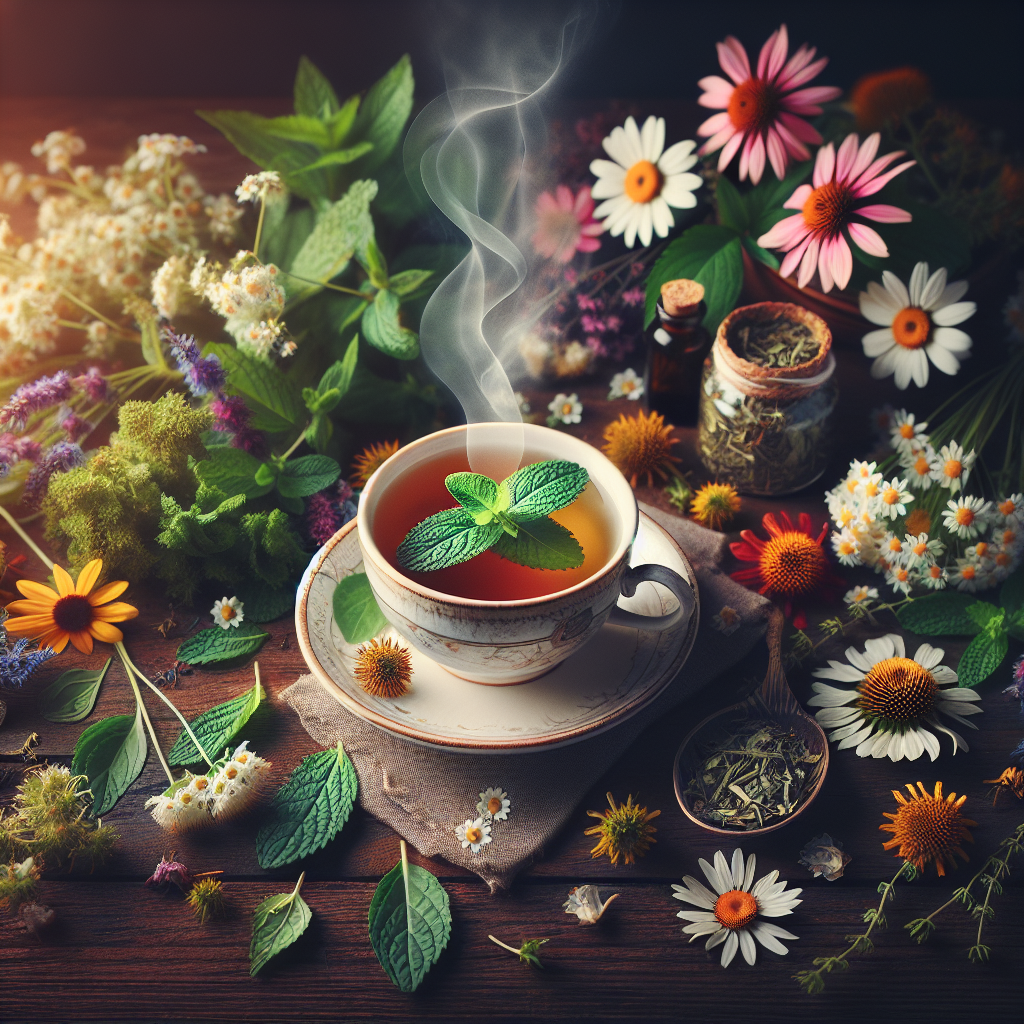If you’ve ever wondered how to bring a sense of calm to your finicky feathered friends, look no further than the power of herbs. Yes, herbs like lavender and chamomile aren’t just for human relaxation; they can also work wonders for calming stressed chickens. By incorporating these natural remedies into their environment or diet, you’ll not only help your chickens find their inner zen but also contribute to their overall well-being. So, get ready to unlock the soothing potential of these herbs and create a harmonious oasis for your beloved cluckers.
Benefits of Using Herbs to Calm Stressed Chickens
If you’re a chicken owner, you know how important it is to keep your feathered friends happy and stress-free. Stress can not only negatively affect their well-being but also impact their overall productivity. That’s where herbs like lavender and chamomile come in. Using herbs as a natural remedy for calming stressed chickens offers numerous benefits that contribute to their health, well-being, and even egg production.
Reduction of Stress Symptoms
One of the primary benefits of using herbs to calm stressed chickens is the reduction of stress symptoms. Chickens that are stressed may exhibit various signs such as feather pecking, irritability, decreased appetite, and a general decline in overall health. By incorporating herbs into their environment, these symptoms can be alleviated, creating a more peaceful and contented flock.
Improved Health and Well-being
Stressed chickens are more susceptible to illnesses and diseases due to their weakened immune system. Herbs like lavender and chamomile possess natural properties that can enhance the health and well-being of chickens. Lavender, for example, is known for its antibacterial and antiviral properties, while chamomile soothes and calms inflammation in the body. By using these herbs, you can promote a healthier and more robust flock.
Enhanced Egg Production
Interestingly, using herbs to calm stressed chickens can also lead to increased egg production. Stress can negatively impact a chicken’s reproductive system, resulting in reduced or even halted egg-laying. By providing a calm and stress-free environment through the use of herbs, chickens can reach their full egg-laying potential. This not only benefits you as a chicken owner but also ensures the overall health and vitality of your chickens.
Understanding the Calming Effects of Lavender and Chamomile
Both lavender and chamomile have long been praised for their calming and soothing effects, not just for humans but also for animals. Understanding how these herbs work to calm stressed chickens can help you make informed decisions about incorporating them into your flock’s routine.
Lavender as a Relaxant
Lavender is known for its distinct aroma and relaxing properties. The scent of lavender has been scientifically proven to reduce stress and anxiety in various animals, including chickens. The aroma of lavender can have a calming effect on the nervous system, helping to alleviate stress and promote a sense of tranquility in chickens. By introducing lavender to their environment, you create a soothing atmosphere that can greatly benefit stressed chickens.
Chamomile as a Sedative
Chamomile is widely recognized for its sedative qualities, making it an excellent herb for calming stressed chickens. Chamomile contains compounds that have a calming and relaxing effect on the body, helping to reduce anxiety and promote sleep. The use of chamomile can help chickens find serenity and peace, ensuring a stress-free environment that is conducive to their overall well-being.
Synergistic Effects of Lavender and Chamomile
While lavender and chamomile are effective on their own, their combined use can create synergistic effects that enhance their calming properties. Combining lavender and chamomile can provide an even greater sense of relaxation and tranquility for your stressed chickens. This potent combination can work together to reduce stress levels and create a peaceful environment that promotes their health and happiness.
Selecting and Preparing Lavender and Chamomile for Use
To fully harness the benefits of lavender and chamomile for calming stressed chickens, it’s essential to know how to select and prepare these herbs properly.
Choosing the Right Species and Variety
When selecting lavender and chamomile, it’s crucial to choose the right species and variety. There are different species of lavender and chamomile, each with varying levels of potency and scent. Lavandula angustifolia and Matricaria chamomilla are the most widely used species for both lavender and chamomile, respectively. Ensure you select organic, pesticide-free varieties to avoid any harmful toxins affecting your chickens.
Harvesting and Drying the Herbs
To use lavender and chamomile effectively, you need to harvest and dry them correctly. Harvest the flowers when they are in full bloom, usually in the morning before the sun becomes too intense. Once harvested, tie them into small bundles and hang them upside down in a warm, dry, and well-ventilated area. Allow the herbs to dry completely before storing them in airtight containers away from direct sunlight.
Creating Herbal Infusions or Teas
To administer lavender and chamomile to your chickens, you can create herbal infusions or teas. Simply steep a handful of dried lavender flowers and chamomile flowers in hot water for several minutes. Once cool, strain the liquid and offer it to your chickens either as a drink or by using a spray bottle to mist their environment. This method provides a direct and effective way to introduce the calming properties of lavender and chamomile to your flock.
Methods of Administering Herbs to Stressed Chickens
Now that you have prepared your lavender and chamomile, it’s time to explore various methods of administering these herbs to your stressed chickens effectively.
Direct Application
One simple way to administer herbs to stressed chickens is through direct application. After drying the lavender and chamomile, crush the dried flowers into a fine powder and sprinkle it around their coop or nesting area. The aroma of the herbs will be released gradually, creating a calming environment for your flock.
Incorporating Herbs into Feed
Another method is to incorporate the herbs into your chickens’ feed. Simply mix the powdered lavender and chamomile into their feed, ensuring they consume the herbs regularly. This method allows for a consistent intake of the calming properties of the herbs, promoting overall well-being and stress reduction.
Herb-Infused Water Sources
Lastly, you can provide herb-infused water sources for your stressed chickens. Add a handful of dried lavender and chamomile flowers to a container of water and allow the herbs to steep for several hours. The resulting infused water can then be offered to your chickens as their drinking water. This method ensures a continuous exposure to the calming effects of lavender and chamomile, effectively reducing stress and improving their overall health.
Monitoring and Measuring Chicken Stress Levels
To effectively gauge the impact of herbs on your stressed chickens, it is essential to monitor and measure their stress levels regularly. By paying attention to their behavior and physical signs, you can assess the effectiveness of the herbs in reducing stress.
Signs of Stress in Chickens
Chickens exhibit various signs when experiencing stress. These may include feather loss, excessive pecking, droopy or ruffled feathers, decreased appetite, reduced egg production, increased aggression, or abnormal vocalization. Monitoring these signs and noting any improvements or changes can help you gauge the level of stress your chickens are experiencing.
Using Scoring Systems
You can also employ scoring systems to quantify the stress levels of your chickens. These scoring systems typically assess certain physiological and behavioral parameters, such as feather condition, posture, vocalization, and activity levels. Regularly scoring your chickens can provide a quantitative measure of how effective the herbs are in reducing their stress levels over time.
Observational Techniques
Another valuable method of monitoring chicken stress is through observational techniques. Spend time observing your flock and note any changes in their behavior and interactions. Calmer, more contented chickens are likely experiencing reduced stress levels, indicating that the herbs are having a positive impact on their overall well-being.
Research Studies on Herb Use for Chicken Stress Reduction
When considering using herbs to calm stressed chickens, it’s helpful to explore the scientific research and studies that have been conducted in this area. These studies provide evidence of the effectiveness and benefits of using herbs for stress reduction in chickens.
Scientific Experiments and Findings
Several scientific experiments have focused on assessing the impact of herbs like lavender and chamomile on chicken stress levels. These studies have consistently shown that the use of these herbs can lead to reduced stress responses in chickens, promoting a calmer and healthier flock.
Effects on Hormone Levels
Research has indicated that herbs like lavender and chamomile can influence hormone levels in chickens. Chickens exposed to these herbs have shown decreased levels of stress hormones such as cortisol, indicating a reduction in stress. This hormonal balance contributes to a positive well-being and improved physiological functioning in chickens.
Assessment of Egg Quality
Studies have also examined the effects of herbs on egg quality in stressed chickens. Findings have suggested that chickens exposed to herbs like lavender and chamomile exhibit improved egg quality, including factors such as shell thickness and yolk color. This indicates that not only are the herbs beneficial for stress reduction but they also positively impact the overall productivity and quality of eggs.
Dosage and Frequency Recommendations
To ensure the safe and effective use of herbs for calming stressed chickens, it’s important to determine the appropriate dosage and frequency of administration.
Determining the Appropriate Dosage
The dosage of lavender and chamomile will depend on various factors, including the size and age of your chickens. As a general guideline, start with a small amount of dried herbs and gradually increase the dosage if needed. Observe your chickens’ response to the herbs and adjust the dosage accordingly. It’s always best to consult with a veterinarian or poultry expert for personalized dosage recommendations.
Timing and Frequency of Administration
The timing and frequency of herb administration are also essential. To establish a routine, introduce the herbs gradually into your chickens’ environment or diet. Aim for daily or regular exposure to ensure a consistent calming effect. The herbs can be administered in the morning and evening or as needed during times of increased stress, such as during extreme weather conditions or predator encounters.
Factors Affecting Individual Sensitivity
Keep in mind that individual chickens may have varying sensitivities to herbs. Some chickens may require a higher dosage to experience the calming effects, while others may be more sensitive and require a lower dosage. Monitor your chickens’ response and adjust the dosage and frequency based on their individual needs and sensitivity levels.
Potential Risks and Precautions
While herbs like lavender and chamomile are generally safe for chickens, it’s important to be aware of potential risks and take necessary precautions.
Allergies and Sensitivities
Just like humans, chickens may have allergies or sensitivities to certain herbs. Monitor your chickens closely after introducing lavender or chamomile to their environment or diet. If you notice any adverse reactions such as excessive itching, respiratory distress, or changes in behavior, discontinue the use of the herbs immediately and consult a veterinarian.
Interactions with Medications
If your chickens are on any medications or supplements, it’s important to consider potential interactions with the herbs. Some medications may interact with lavender and chamomile, reducing their effectiveness or causing adverse effects. Consult with a veterinarian to ensure the safe use of herbs alongside any existing medications.
Avoiding Overuse or Dependency
While herbs can be a valuable tool in calming stressed chickens, it’s essential to avoid overuse or dependency. Continuous exposure to herbs without periods of herb-free time may lead to chickens becoming dependent on the calming effects of herbs. Use herbs as a supplementary measure alongside other stress reduction techniques, allowing your chickens to develop natural coping mechanisms.
Alternative Calming Methods for Stressed Chickens
While herbs like lavender and chamomile are highly effective, there are other alternative methods to consider for calming stressed chickens.
Environmental Modifications
Creating a stress-free environment is key to promoting a sense of calmness in your flock. Make sure their coop is clean, well-ventilated, and properly sized to accommodate their needs. Providing adequate space, natural light, and opportunities for exercise and socialization can greatly reduce stress levels in chickens.
Companion Animals
Introducing companion animals, such as gentle and calm dogs or other compatible farm animals, can also provide a calming presence among your chickens. The presence of a trusted companion can help alleviate stress and promote a sense of security and well-being in your flock.
Behavioral Training
Implementing behavioral training techniques can also contribute to stress reduction in chickens. Training chickens to respond to cues or commands can help redirect their energy and focus, resulting in reduced stress levels. Positive reinforcement methods can be used to reward desired behaviors, reinforcing a calm and contented demeanor.
Conclusion
Using herbs like lavender and chamomile to calm stressed chickens offers numerous benefits, from reducing stress symptoms to promoting better health and enhanced egg production. Understanding the calming effects of these herbs, selecting and preparing them correctly, and administering them effectively can greatly contribute to your flock’s well-being. By monitoring stress levels, following appropriate dosage and frequency recommendations, and considering potential risks and alternatives, you can ensure a calm and contented flock that thrives in a stress-free environment. Remember, a happy and stress-free chicken is a healthier and more productive chicken.




